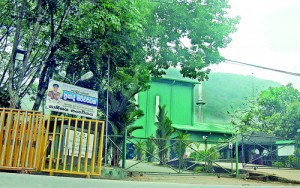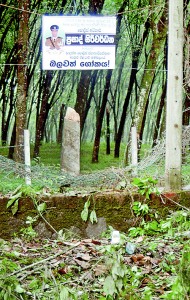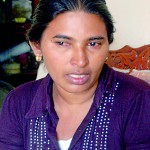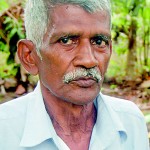News
Hanwella protest a repeat of Rathupaswela?
A village monk had encouraged the people of Thunthana in Hanwella to rise against a rubber glove factory by saying its effluents were contaminating the water in the area, residents said last week.

The factory at the centre of the controversy. Pix by Nilan Maligaspe
In an incident strongly reminiscent of Rathupaswela, hundreds of people protested on March 15 and 16 demanding the closure of the Hanwella Rubber Products Factory. They claimed that chemicals it discharged had made their groundwater acidic. One policeman was killed and nine others injured by a falling tree during the demonstration.
“Podi hamuduruwo in our village organised a meeting with a group of people in early January and I attended it,” one resident said, requesting anonymity. She was referring to Ven. Sumana Lankara Thera of Maithree Bauddha Madyasthanaya. “He said the waste water from this rubber glove factory was contaminating our water. He said this posed a severe health hazard to us, especially the children.”
The monk informed them that pH levels in the groundwater were low and that it was not suitable for drinking. “He asked me to lead the residents near my house and to test the water in our wells for contamination,” this resident said. “Several of us did this and it was revealed that the pH levels were indeed low.”
A large number of agitated families then stopped drinking from their wells. Some walked for miles to fetch ‘fresh’ water. In Rathupaswela, too, a Buddhist monk had led several protests against a rubber glove factory which was alleged to have been contaminating the groundwater.

A banner in remembrance of the OIC at the spot where the tree fell
Residents of Hanwella said this week that they were suffering from skin ailments and kidney problems and experiencing breathing difficulties as a result of consuming their well water. Inhabitants of Rathupaswela had complained of similar symptoms and farmers of both areas claimed that paddy did not thrive in their fields.
“I spent over Rs. 70,000 to cultivate my two-acre plot,” said one farmer, who also did not wish to be named. “We are trying our best to harvest what we can. Water from the factory is released into drains and reaches our fields. This water has destroyed the plants. Even the freshwater fish are dead now.”
On Wednesday, three days after noisy protests, the streets of Hanwella were empty of residents. In their place was a large contingent of Army, Police and Special Task Force personnel. Many of them were deployed around the factory. Villagers said the men were hiding in fear that the police would swoop down and arrest them in connection with the violent demonstration.
Since their meeting with Ven. Sumana Lankara Thera in January, residents had notified the authorities several times of their concerns. On February 9, some Buddhist prelates, public health officers and members of the Western Provincial Council held a discussion with the residents.
This week the residents said those public health officers had told them that water samples taken from their wells had yielded e-coli bacteria. They had also reportedly warned that this could cause serious health problems including kidney and brain diseases.
In the meantime, the factory management had taken steps to supply clean water to the residents and had also met the water bills of some of the villagers who had started receiving pipe-borne water two months ago. Residents asked why the management agreed to such a thing if the well water was, in fact, uncontaminated.
A series of protests were organised, including two in February. The last one started on March 15 and continued till the next day when it turned violent.

Priyanthi Beddagamage
“Is there any place on earth where water is provided separately when the groundwater is pure?” asked W. Wimaladasa, a 60-year-old father-of-three who participated in the protest. “We knew there was something wrong. That’s why we met in front of the factory. It was a peaceful protest asking the President to give us a solution before it turned into another Rathupaswela.”
According to Mr. Wimaladasa, events took a new turn around 6 a.m. last Sunday. “The police came and shouted at us using foul language,” he claimed. “They even attacked us with batons and used tear gas.” Some had tried to escape by running into the village temple. The police allegedly chased them inside and assaulted them.
“It was Poya day and women, children and old people had come to the temple to observe sil,” said R. I. Dassanayake (53). This father-of-two was also detained by police. “Still, the police threw tear-gas near the temple. They even assaulted some men and arrested them.” He added that several women had been dragged into buses and taken to the Homagama and Padukka police stations.
“My 23-year-old daughter was also in the temple,” said a resident who was too afraid to disclose her name. “The police had hit her on

W. Wimaladasa
her hip and shoulder. They had threatened to kill her if she protested. She suffered great mental strain. She no longer sleeps or stays by herself.”
Raju, the husband of 43-year-old Priyanthi Beddagamage, was among the severely injured. Raju is receiving treatment for serious injury to his eye caused when a policeman hit his head with a baton.
“Raju is a peaceable man,” Mrs. Beddagamage said. “He doesn’t like violence and is afraid of the police. He was reading the newspaper when he heard people screaming and running. He went to see what was going on.” She cried silently, hugging her 12-year-old daughter who was also weeping.
After the attack, Raju had been only semi-conscious and bleeding but he was dragged into a police jeep and taken to the station. His wife claims he was not given water or anything to stop the flow of blood. Meanwhile, she went from house to house, searching for him ‘like a mad woman’. She was later told that he had been taken to hospital as his injuries were of a serious nature.
| Factory management rejects all allegations
The management of Dipped Products Plc rejected all allegations against the factory. Both Dipped Products and the Hanwella Rubber Products Company are subsidiaries of the Hayleys Group. “Our factory was issued an Environment Protection Licence and we are operating according to the required standards,” said Dr. Mahesh Ranasoma, Dipped Products Managing Director. He said the factory was acquired in 2006 from a different owner. “Some residents asked for piped water saying their well water was not suitable for drinking,” he explained. “We gave connections to all those who came to us.” He also commented on Rathupaswela, saying the protests there had been unfortunate as the factory was not the cause of the low pH of the groundwater. pH levels are generally low in wet regions, Mr. Alahapperuma said. The CEA had looked into all aspects concerning the factory in Hanwella and found normal limits. The tests did, however, reveal an increase in e-coli levels. This was due to human and animal activities, he said. |


